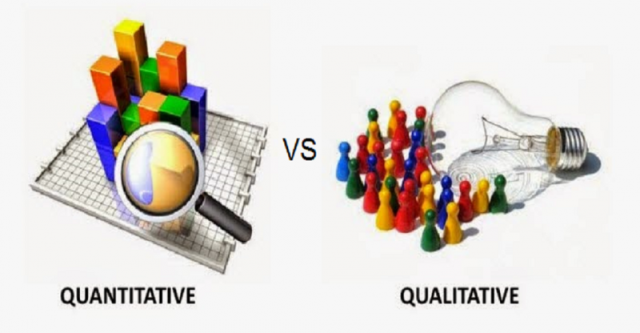In today's world, research has acquired a high level of importance considering that most of the things that are known today are based on the infinite number of studies that have been carried out, which has motivated researchers to improve the methods and techniques.

The researcher must clarify the direction he wants his study to take, supporting his selection in: the objectives pursued by his research, the nature of the information he requires, the techniques and data collection tools that he will use, among other aspects They will be useful to define the approach that will give your research.
In this order of ideas and based on the bibliographies consulted, most authors establish that there are currently two main approaches for scientific research: Qualitative Approach and Quantitative Approach
Quantitative Approach
In an investigation with a quantitative approach, the information that is collected has a numerical character and is available for measurements through the use of statistical techniques and methodically. Although in metrology, any measurement that is made has an associated uncertainty value, for the purposes of applying the quantitative method, the researcher performs a comprehensive control of the variables involved, minimizing the value of the uncertainty of the measurement to its maximum expression, obtaining Accurate and reliable results that provide knowledge and can be verified at any time.Qualitative Approach
On the other hand, in research with a qualitative approach, the information collected is purely interpretive and is closely linked to the researcher's judgment, mainly considering the experiences, perspectives and points of view of those involved in the subject of study, in this case the The researcher does not follow a specific process, that is to say that it is not obligatory for one step to precede another, on the contrary it will depend on the dynamics that the researcher justifies necessary according to the subject under study.
Currently in the methodological world of scientific research are different classifications and concepts that are attached to the research, however according to the analysis made by the author of this post, considers that regardless of the type of research, the same will generally be oriented or will rely on the practice of quantitative or qualitative elements.
The controversy of establishing one of the two approaches is given because they handle different conceptions. From there to these approaches can be checked as follows:
- During the development of quantitative research information is collected and obtained with numerical forms, while qualitative research the information that is handled is defined in the form of words and texts.
- The quantitative approach necessarily employs statistical analysis techniques, to process the information and the qualitative approach does not require statistical support, is based on the interpretation of the observed.
- Quantitative guidance guides research under a strict, inflexible, methodical margin to obtain information; the qualitative one allows the researcher the dispersion and flexibility.
- In quantitative research hypotheses are generated prior to the collection of information, since once obtained it will be known if these hypotheses are accepted or if on the contrary they are rejected, having as one of the objectives of this type of study subject to Test the hypotheses. While in qualitative research hypotheses are created during the development of information or at the conclusion of the study. From this it can be deduced, that of the hypotheses generated at the end of a qualitative study can give rise to the verification of these hypotheses by the beginning of a quantitative study.
From the above, it is reliable to say that one method is not outstanding compared to the other, because each one understands its own characteristics, which are left to the investigator, who is committed to the goals pursued by his research
Mixed approach

Image
Starting from the idea that both approaches are very valuable, in recent times researchers have given space to the combination of the two approaches, complementing each other, called Mixed Approach, in many cases it has been ideal to carry successfully complete certain investigations.
Although, the application of mixed approaches is advantageous, it is necessary that the researcher who assumes the commitment knows and differentiates what he / she intends to perceive with the application of each approach, avoiding that one method takes away the importance of the other, in order that the sense of the quantitative combination with the qualitative is lost.
This post was made with the intention of contributing to the strengthening of your knowledge in the field of research
@rosange
Bibliographic references
- Bisquerra, R. (1989). Métodos de investigación educativa: Guía práctica. (1ª. Ed. pp-55-69). Barcelona: CEAC.
- Cerda, H. (1991). Los Elementos de la investigación. (1ª. ed. pp. 45-103). Bogotá: El Buhó.
- Hernández, R. Fernández, C. y Baptista, P. (2006). Metodología de la Investigación. Fourth edition. México: Mc Graw Hill.
- http://biblo.una.edu.ve/documentos/enfoque.pdf
- https://explorable.com/es/investigacion-cuantitativa-y-cualitativa


Este post me trajo recuerdos cuando estudiaba en la universidad en Venezuela, la materia "metodos de la investigacion" buen trabajo,
saludos!